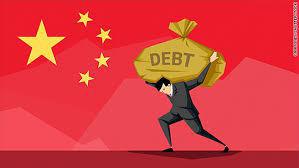
A former International Monetary Fund (IMF) economist believes that everyone in the world would be hit by a fallout of the soaring debt levels in China which were a source of serious concern.
"If there's a country in the world which is really going to affect everyone else and which is vulnerable, it's got to be China today," Kenneth Rogoff, economics professor at Harvard University, said in a television interview.
"The whole region's dependent on China... so I certaintly think you could see (the export of) a recession out of China," added Rogoff, who was chief economist and research director at the International Monetary Fund from 2001 to 2003.
While trying to rein in high debt levels, China, the world second-largest economy, grapples with growing pains and his comments comes amidst such an economic environment.
"They are trying to keep up their growth, (but) there are lot of factors that would constrain it, particularly as they move from being export-led to domestic-driven," he added.
Rogoff said that it would also be difficult for China to shift gears to a consumption-led economy just as this phenomena or attempt has been tough for everyone else. The explosive e growth in China has been fueled with the help of a massive credit buildup which is the cause of the concerns.
"China has a lot of capacity to absorb its credit problems, because in some sense, the private sector has a government shell over it, but it depends on rapid credit growth to grow," he said. "When they slow down credit, growth slows down. So you don't necessarily have to have cascading defaults to have a pretty sharp drop in growth," he said.
As policy makers' stimulus efforts have also spurred a leverage buildup, concerns over China's economy have grown.
Concerns that China's effort to support economic growth would spur higher debt levels were expressed by Moody's Investors Service in late May. Such concerns led the ratings service agency to its outlook to stable from negative as the ratings agency downgraded the mainland’s sovereign credit rating.
Up from 158.3 trillion yuan, or 231 percent of GDP, at the end of 2015, China’s outstanding non-financial sector debt hit 191.3 trillion yuan ($27.96 trillion), or 251 percent of gross domestic product (GDP) in the first quarter, Nomura estimated in a recent note.
At around 3 percent of gross domestic product (GDP), the government budget deficit in 2016 was "moderate", Moody's estimated. But by the end of the decade, the government's debt burden is expected to rise to 45 per cent of GDP in China and rise toward 40 percent of GDP by 2018, the agency expects.
The Institute of International Finance said in a May note that official data put total government debt at the end of 2016 was 37 percent of GDP.
(Source:www.cnbc.com)
"If there's a country in the world which is really going to affect everyone else and which is vulnerable, it's got to be China today," Kenneth Rogoff, economics professor at Harvard University, said in a television interview.
"The whole region's dependent on China... so I certaintly think you could see (the export of) a recession out of China," added Rogoff, who was chief economist and research director at the International Monetary Fund from 2001 to 2003.
While trying to rein in high debt levels, China, the world second-largest economy, grapples with growing pains and his comments comes amidst such an economic environment.
"They are trying to keep up their growth, (but) there are lot of factors that would constrain it, particularly as they move from being export-led to domestic-driven," he added.
Rogoff said that it would also be difficult for China to shift gears to a consumption-led economy just as this phenomena or attempt has been tough for everyone else. The explosive e growth in China has been fueled with the help of a massive credit buildup which is the cause of the concerns.
"China has a lot of capacity to absorb its credit problems, because in some sense, the private sector has a government shell over it, but it depends on rapid credit growth to grow," he said. "When they slow down credit, growth slows down. So you don't necessarily have to have cascading defaults to have a pretty sharp drop in growth," he said.
As policy makers' stimulus efforts have also spurred a leverage buildup, concerns over China's economy have grown.
Concerns that China's effort to support economic growth would spur higher debt levels were expressed by Moody's Investors Service in late May. Such concerns led the ratings service agency to its outlook to stable from negative as the ratings agency downgraded the mainland’s sovereign credit rating.
Up from 158.3 trillion yuan, or 231 percent of GDP, at the end of 2015, China’s outstanding non-financial sector debt hit 191.3 trillion yuan ($27.96 trillion), or 251 percent of gross domestic product (GDP) in the first quarter, Nomura estimated in a recent note.
At around 3 percent of gross domestic product (GDP), the government budget deficit in 2016 was "moderate", Moody's estimated. But by the end of the decade, the government's debt burden is expected to rise to 45 per cent of GDP in China and rise toward 40 percent of GDP by 2018, the agency expects.
The Institute of International Finance said in a May note that official data put total government debt at the end of 2016 was 37 percent of GDP.
(Source:www.cnbc.com)